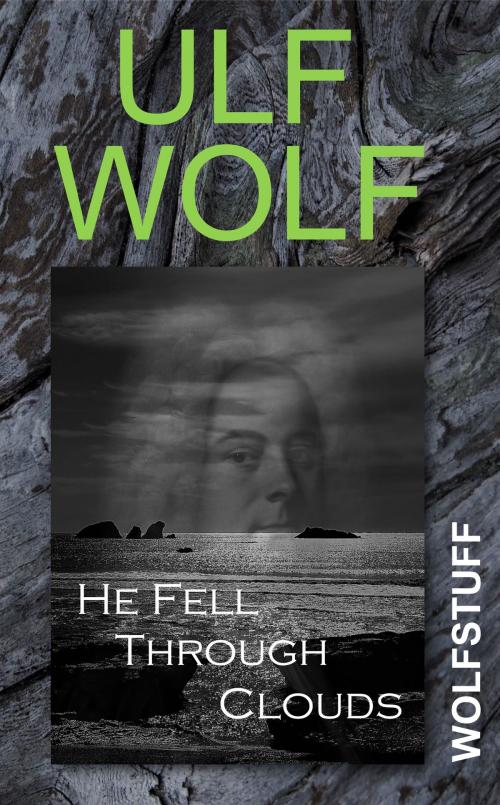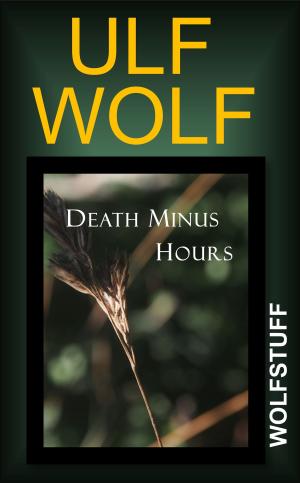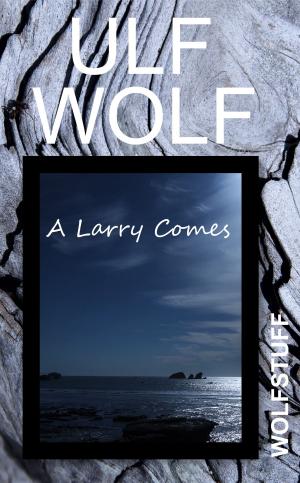| Author: | Ulf Wolf | ISBN: | 9781301525867 |
| Publisher: | Ulf Wolf | Publication: | October 24, 2012 |
| Imprint: | Smashwords Edition | Language: | English |
| Author: | Ulf Wolf |
| ISBN: | 9781301525867 |
| Publisher: | Ulf Wolf |
| Publication: | October 24, 2012 |
| Imprint: | Smashwords Edition |
| Language: | English |
He knew by the cry of locked wheels on tarmac, by the sting of rubber smoke in his nostrils, by the core of silence in which he found himself despite the noise—and perhaps mostly by this stillness—that he was not going to make it.
He knew as he rushed towards it, or it towards him—for he felt stationary; knew as he saw the number painted on the undercarriage and looked again to make it out, 486 it said, paint peeling, or fading, no, it was peeling; he knew then, in the near timelessness of this immediacy, and with astonishing clarity, that he was going to die.
The tractor-trailer had just overtaken him. It had come up from behind, speeding surely, had blasted its horn once, then again—he had almost sensed the irritation, this was a vehicle used to being heard the first time—had then swung left and rumbled past him like an indignant mountain on the move. That accomplished, the eighteen-wheeler, without signaling, simply taking what was rightfully his, had steered right again, back to the slower lanes, its proper territory.
But a small foreign car, new and blue or blue-green and perhaps three car-lengths ahead, was in the rig’s way. This driver either didn’t notice or didn’t care. Neither did the rig.
The collision wasn’t much at first, just a touch, a scraping. But then the rig, as if suddenly aware, convulsed and slammed on the brakes. Smoke streamed from the locked wheels as it began skidding to its right.
He had all the time in the world to make up his mind, at least that is how it seemed. One moment came, stayed a while, then the next, each slow and long. He thought, and noticed himself thinking: he could simply brake and yes, possibly lose control, though that would lessen the impact, or—possibly a safer choice—he could perhaps avoid the sliding rig altogether by veering left for the fast lane, clearing now as the rig continued sliding to the right.
He made his choice and eased the steering wheel to the left, thinking yes, yes, he would miss the rig, easy does it, but not too fast since the rig, a helpless whale now, was slowing fast and not entirely out of the fast lane yet.
Then, and he should have done this sooner, halfway into the fast lane he glanced in his rearview mirror and saw the gray Pontiac—yes it was a Pontiac—come up from behind him at speed, also heading for the fast lane. To get out of Pontiac’s way and into the fast lane before him, he floored the accelerator and heard his Toyota gear down to gather strength and speed. But not fast enough.
Two things: the Pontiac, no doubt distracted by the skidding rig, did not hit the brakes in time; and the rig was not yet all the way out of the fast lane, now almost sideways in its slide. The Pontiac caught up and struck him from behind, careening him, still accelerating, directly into the trailer.
Those numbers, four eight six on the grimy blue of the undercarriage, were the last things he saw.
Metal screaming and the destruction of glass were the last things he heard.
Had he put away his groceries? was his final thought.
The impact was curious. There was pain, surely. There must have been pain, but if there were, it was very sudden and gone too soon to actually register.
No, not really pain. It was more like a burst of wind, a rushing upward from his feet to his head as iron and force crushed lungs and spine and his head was all but severed in this single act of bad luck and mechanical violence. The gust, like a giant exhaling, seized him and pulled him up and out and clear of the wreckage.
====
“A masterpiece of vivid characterization and unrelenting suspense.” — Alan Graham, Words & Pictures Press
He knew by the cry of locked wheels on tarmac, by the sting of rubber smoke in his nostrils, by the core of silence in which he found himself despite the noise—and perhaps mostly by this stillness—that he was not going to make it.
He knew as he rushed towards it, or it towards him—for he felt stationary; knew as he saw the number painted on the undercarriage and looked again to make it out, 486 it said, paint peeling, or fading, no, it was peeling; he knew then, in the near timelessness of this immediacy, and with astonishing clarity, that he was going to die.
The tractor-trailer had just overtaken him. It had come up from behind, speeding surely, had blasted its horn once, then again—he had almost sensed the irritation, this was a vehicle used to being heard the first time—had then swung left and rumbled past him like an indignant mountain on the move. That accomplished, the eighteen-wheeler, without signaling, simply taking what was rightfully his, had steered right again, back to the slower lanes, its proper territory.
But a small foreign car, new and blue or blue-green and perhaps three car-lengths ahead, was in the rig’s way. This driver either didn’t notice or didn’t care. Neither did the rig.
The collision wasn’t much at first, just a touch, a scraping. But then the rig, as if suddenly aware, convulsed and slammed on the brakes. Smoke streamed from the locked wheels as it began skidding to its right.
He had all the time in the world to make up his mind, at least that is how it seemed. One moment came, stayed a while, then the next, each slow and long. He thought, and noticed himself thinking: he could simply brake and yes, possibly lose control, though that would lessen the impact, or—possibly a safer choice—he could perhaps avoid the sliding rig altogether by veering left for the fast lane, clearing now as the rig continued sliding to the right.
He made his choice and eased the steering wheel to the left, thinking yes, yes, he would miss the rig, easy does it, but not too fast since the rig, a helpless whale now, was slowing fast and not entirely out of the fast lane yet.
Then, and he should have done this sooner, halfway into the fast lane he glanced in his rearview mirror and saw the gray Pontiac—yes it was a Pontiac—come up from behind him at speed, also heading for the fast lane. To get out of Pontiac’s way and into the fast lane before him, he floored the accelerator and heard his Toyota gear down to gather strength and speed. But not fast enough.
Two things: the Pontiac, no doubt distracted by the skidding rig, did not hit the brakes in time; and the rig was not yet all the way out of the fast lane, now almost sideways in its slide. The Pontiac caught up and struck him from behind, careening him, still accelerating, directly into the trailer.
Those numbers, four eight six on the grimy blue of the undercarriage, were the last things he saw.
Metal screaming and the destruction of glass were the last things he heard.
Had he put away his groceries? was his final thought.
The impact was curious. There was pain, surely. There must have been pain, but if there were, it was very sudden and gone too soon to actually register.
No, not really pain. It was more like a burst of wind, a rushing upward from his feet to his head as iron and force crushed lungs and spine and his head was all but severed in this single act of bad luck and mechanical violence. The gust, like a giant exhaling, seized him and pulled him up and out and clear of the wreckage.
====
“A masterpiece of vivid characterization and unrelenting suspense.” — Alan Graham, Words & Pictures Press















